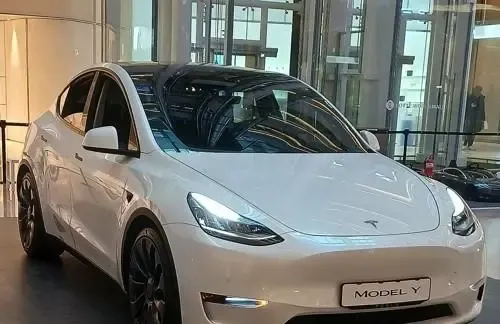Why Did Imported Car Sales in South Korea Increase by 32% in September?

Synopsis
Key Takeaways
- 32.2% increase in imported vehicle sales in South Korea.
- Tesla leads the market with strong sales figures.
- New models and marketing strategies contributed to sales growth.
- Hybrid vehicles represented over half of the total sales.
- Government subsidies are making electric vehicles more accessible.
Seoul, Oct 10 (NationPress) Sales of imported vehicles in South Korea surged by over 30 percent in September compared to the previous year, fueled by high demand for Tesla and consistent sales of hybrid and electric vehicles (EVs), as revealed by industry data on Friday.
The Korea Automobile Importers & Distributors Association (KAIDA) reported that the count of newly registered imported cars reached 32,834 units last month, marking a 32.2 percent increase from 24,839 units during the same period last year.
KAIDA credited this sales boost to steady supply from various brands, the introduction of new models, and vigorous marketing initiatives.
In terms of brands, Tesla led the market for the third month in a row with 9,069 units sold, followed by Mercedes-Benz at 6,904 units, BMW at 6,610 units, Audi at 1,426 units, Lexus at 1,417 units, and Volvo at 1,399 units.
The Tesla Model Y emerged as the top-selling model with 8,361 units sold, followed by the Mercedes-Benz E-Class with 3,239 units, BMW 5 Series at 2,196 units, and BYD's Sealion 7 at 825 units.
When categorized by fuel type, hybrid vehicles accounted for 16,585 units, representing 50.5 percent of the total, while EVs made up 39.3 percent, gasoline models comprised 9.5 percent, and diesel models accounted for 0.7 percent.
Additionally, KAIDA reported a 22.6 percent increase in imported vehicle sales in August compared to the previous year, spurred by strong interest in newly launched models.
The number of newly registered imported cars in August stood at 27,304 units, up from 22,263 units in the same month last year, according to the data.
KAIDA indicated that the monthly results were bolstered by robust sales of new models such as the Tesla Model Y and Model 3.
The three best-selling models in August were Tesla's Model Y, Model Y Long Range, and Model 3, as per the data.
Tesla's vehicle registrations saw a remarkable increase, tripling to 7,974 units last month from 2,208 units a year earlier.
An industry representative noted, "Many young customers in their 20s and 30s have chosen Tesla models due to more affordable prices following government subsidies for all-electric vehicles."
-_IANS









